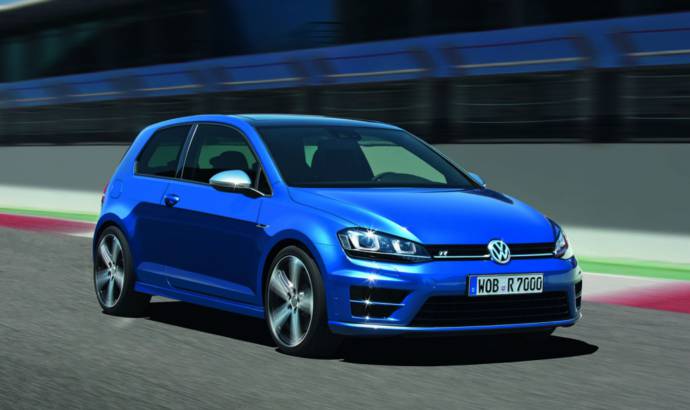From today UK customers can place their orders for the most powerful production Golf yet, the 300 PS Golf R, ahead of the first deliveries in March 2014. Prices for the range-topping R start at £29,900 for the three-door model with six-speed manual gearbox, and £31,315 for the three-door with six-speed DSG gearbox. The five-door versions cost £30,555 and £31,970 respectively.
At the heart of the R is a newly developed version of the four-cylinder 2.0-litre turbocharged EA888 TSI petrol engine used in the latest Golf GTI, but in this application producing 300 PS from 5,500 to 6,200 rpm and 380 Nm (280 lbs ft) from 1,800 to 5,500 rpm. Compared with the GTI’s powerplant, the Golf R’s engine has a modified cylinder head, exhaust valves, valve seats and springs, pistons, injection valves and turbocharger.
Zero to 62 mph takes 5.3 seconds (versus 5.7 seconds for previous Golf R), or 4.9 seconds with optional DSG gearbox. The top speed is electronically limited to 155 mph. Despite this increased performance, a combined fuel consumption of 39.8 mpg (40.9 mpg DSG), and CO2 emissions of 165 g/km (159 g/km DSG) make the Golf R up to 18 per cent more efficient than its predecessor.
The R uses a fifth-generation Haldex 4MOTION four-wheel drive system. Under low loads or when coasting, the rear axle is decoupled, helping to reduce fuel consumption. Drive to the rear axle can be engaged in fractions of a second via the Haldex coupling, which is actuated by an electro-hydraulic pump. Almost 100 per cent of power can be transferred to the rear axle.
The ride height is 20 mm lower than the standard Golf’s (5 mm lower than the GTI’s), while Adaptive Chassis Control (DCC) is an option. For the first time, this offers a ‘Race’ mode, which increases damping, thereby reducing body movements. In conjunction with the driver profile selector (standard on all Golfs from SE), Race mode also attenuates throttle response, and alters the shift pattern of the DSG gearbox (where fitted).
On top of ESC Sport mode, as found on the GTI and GTD, which delays intervention of the electronic stability control system, the R offers the option fully to disengage the ESC, for track driving.
Like the Golf GTI and GTD, the Golf R is equipped with progressive steering, which reduces the number of turns lock to lock to just 2.1, from 2.75.
Visually, the R is distinguished by its new front bumper design, with large air inlets, modified radiator grille with ‘R’ logo and daytime running lights that are integrated into the standard bi-xenon headlights. At the side, there are bespoke body-colour sills, and matt chrome-capped door mirrors.
The standard wheels are 18-inch ‘Cadiz’ alloys with 225/40 tyres, while 19-inch ‘Pretoria’ alloys are optional. The brakes are ventilated discs all round, and measure 30 mm by 340 mm at the front and 22 mm by 310 mm at the rear.
Like all Golf Mk VIIs, the Golf R is lighter than its predecessor, with a kerbweight of 1,476 kg / 1,495 kg for DSG, which is 45 kg / 46 kg less than the Mk VI, and just 94 kg / 93 kg more than the GTI with Performance Pack.
The interior features cloth sports seats with Alcantara bolsters, with leather upholstery available as an option, while the instrument dials are bespoke for the R, and include typical touches such as blue needles.



